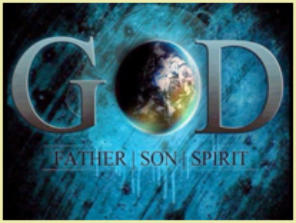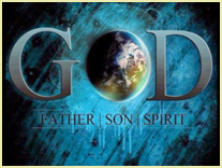INFINITY AND THE TRINITY
After
all
of
the
Scriptures
which
pertain
to
the
question
of
whether
God
is
an
absolute
one
or
three
persons
in
one
are
collated
and
analyzed,
the
answer
to
this
question
often
comes
down
to
whether
it
is
comprehensible
that
God
can
be
three
and
one
at
the
same
time.
Thus,
the
answer
to
this
question,
in
the
minds
of
many
people,
pivots
on
whether
the
Trinity
is
a
rational
concept.
Since
the
concept
of
the
Trinity,
three
persons
working
in
perfect
unison,
is
not
comprehensible,
some
think
that
it
cannot
be
true.
To
them,
the
Trinity
can
be
nothing
more
than
“Tri-theism,”
or
polytheism,
which
the Bible everywhere condemns (e.g., Deut. 6:4; 1 Tim. 2:5).
However,
great
caution
must
be
exercised
in
taking
this
approach
to
interpreting
the
Bible,
for
a
couple
of
seemingly
opposite,
but
important,
considerations
must
be
balanced.
On
the
one
hand,
many
of
God’s
truths
do
not
fall
within
the
scope
of
human
understanding.
So,
if
anything
which
does
not
conform
to
our
understanding
is
deemed
false
for
that
very
reason,
then
important
truths,
otherwise
plainly
asserted
in
the
Bible,
would
have
to
be
ruled
out.
Yet,
since
God
does
not
think
like
humans
do
(1
Sam.
16:7;
Isa.
55:8,9),
it
does
not
follow
that
whatever
is
not
comprehensible
to
them
must
be
untrue.
“…
With
God,
all
things
are
possible”
(Matt.
19:26).
God’s
ways
are
simply unfathomable to humans (Rom. 11:33).
On
the
other
hand,
it
is
also
true
that
humans
are
made
in
God’s
image
(Gen.
1:26,27),
and
that
must
include
the
fact
that
they
are
able
to
interact
rationally
with
Him
(cf.
Isa.
1:18).
From
the
very
beginning,
God
communicated
with
humans
in
a
way
they
could
understand
(Gen.
2:16,17;
3:2,3).
This
means
that
God’s
communications must ultimately not be self-contradictory.
The
balancing
point
between
these
two
seemingly
opposing
views,
then,
is
that
the
Bible
is
internally
rational.
That
is,
it
agrees
with
itself.
Yet,
it
does
not
necessarily
agree
with
what
human
rationality
demands.
As
applied
to
the
Trinity,
this
means
that,
since
the
concept
of
the
Trinity,
or
three
acting
in
perfect
unison,
even
to
the
extent
that
they
are
effectively
one,
must
not
be
rejected
just
because
it
might
be
beyond
the
pale
of
human
comprehension.
From
the
“let
Us”
of
the
creation
account
(Gen.
1:26),
the
Bible
has
plainly
portrayed
God
as
a
“plural
one.”
Thus,
the
only
reason
the
Trinity
is
any
less
comprehensible
than
other
instances
of
a
“plural
one,”
such
as
two
being
one
in
marriage
or
fifty
states
being
one
in
the
United
States,
is
because
experience
shows
that
the
“plural
one”
of
marriage
and
the
United
States
is
far
less
than
perfect,
so
that
humans
cannot
conceive
of
such
oneness
as
is asserted for the Trinity as even being possible.
Yet,
experience
shows
that,
just
because
something
is
incomprehensible,
that
does
not
mean
it
cannot
be
true.
For
example,
all
agree
that
infinity
is
real
though
it
is
incomprehensible.
All
agree
that
space
has
no
end,
even
if
that
is
utterly
incomprehensible.
Therefore,
why
should
the
fact
that
God
is
one
in
three
persons
be
rejected
because
it
is
incomprehensible,
but
the
fact
that
God
is
eternal
be
accepted
even
though
it
is
equally
incomprehensible?
Jesus
shows
Himself
to
be
perfectly
comfortable
with
these
two
seemingly
conflicting
principles
(that
the
Bible
is
comprehensible
but
also
declares
what
is
incomprehensible)
in
two
statements
lying
just
five
verses
apart.
He
asserts
that
“I
and
the
Father
are
one”
(Jn.
10:30)
but
also
cautions,
lest
humans
revolt
against
this,
that
“the
Scripture
cannot
be
broken”
(vs.
35).
That
the
Bible
teaches
something may be comprehensible, even if
how
it can teach it is not.






“Oh,
the
depth
of
the
riches
both
of
the
wisdom
and
knowledge
of
God!
How
unsearchable
are
His
judgments
and
unfathomable
His
ways!
For
who
has
known
the
mind
of
the
Lord,
or
who
became
His
counselor?
Or
who
has
first
given
to
Him
that
it might be paid back to him again? (Romans 11:33-35)
.




“Oh,
the
depth
of
the
riches
both
of
the
wisdom
and
knowledge
of
God!
How
unsearchable
are
His
judgments
and
unfathomable
His
ways!
For
who
has
known
the
mind
of
the
Lord,
or
who
became
His
counselor?
Or
who
has
first
given
to
Him
that
it
might be paid back to him again? (Romans 11:33-35).
INFINITY AND THE TRINITY
After
all
of
the
Scriptures
which
pertain
to
the
question
of
whether
God
is
an
absolute
one
or
three
persons
in
one
are
collated
and
analyzed,
the
answer
to
this
question
often
comes
down
to
whether
it
is
comprehensible
that
God
can
be
three
and
one
at
the
same
time.
Thus,
the
answer
to
this
question,
in
the
minds
of
many
people,
pivots
on
whether
the
Trinity
is
a
rational
concept.
Since
the
concept
of
the
Trinity,
three
persons
working
in
perfect
unison,
is
not
comprehensible,
some
think
that
it
cannot
be
true.
To
them,
the
Trinity
can
be
nothing
more
than
“Tri-
theism,”
or
polytheism,
which
the
Bible
everywhere
condemns (e.g., Deut. 6:4; 1 Tim. 2:5).
However,
great
caution
must
be
exercised
in
taking
this
approach
to
interpreting
the
Bible,
for
a
couple
of
seemingly
opposite,
but
important,
considerations
must
be
balanced.
On
the
one
hand,
many
of
God’s
truths
do
not
fall
within
the
scope
of
human
understanding.
So,
if
anything
which
does
not
conform
to
our
understanding
is
deemed
false
for
that
very
reason,
then
important
truths,
otherwise
plainly
asserted
in
the
Bible,
would
have
to
be
ruled
out.
Yet,
since
God
does
not
think
like
humans
do
(1
Sam.
16:7;
Isa.
55:8,9),
it
does
not
follow
that
whatever
is
not
comprehensible
to
them
must
be
untrue.
“…
With
God,
all
things
are
possible”
(Matt.
19:26).
God’s
ways are simply unfathomable to humans (Rom. 11:33).
On
the
other
hand,
it
is
also
true
that
humans
are
made
in
God’s
image
(Gen.
1:26,27),
and
that
must
include
the
fact
that
they
are
able
to
interact
rationally
with
Him
(cf.
Isa.
1:18).
From
the
very
beginning,
God
communicated
with
humans
in
a
way
they
could
understand
(Gen.
2:16,17;
3:2,3).
This
means
that
God’s
communications
must
ultimately
not
be
self-
contradictory.
The
balancing
point
between
these
two
seemingly
opposing
views,
then,
is
that
the
Bible
is
internally
rational.
That
is,
it
agrees
with
itself.
Yet,
it
does
not
necessarily
agree
with
what
human
rationality
demands.
As
applied
to
the
Trinity,
this
means
that,
since
the
concept
of
the
Trinity,
or
three
acting
in
perfect
unison,
even
to
the
extent
that
they
are
effectively
one,
must
not
be
rejected
just
because
it
might
be
beyond
the
pale
of
human
comprehension.
From
the
“let
Us”
of
the
creation
account
(Gen.
1:26),
the
Bible
has
plainly
portrayed
God
as
a
“plural
one.”
Thus,
the
only
reason
the
Trinity
is
any
less
comprehensible
than
other
instances
of
a
“plural
one,”
such
as
two
being
one
in
marriage
or
fifty
states
being
one
in
the
United
States,
is
because
experience
shows
that
the
“plural
one”
of
marriage
and
the
United
States
is
far
less
than
perfect,
so
that
humans
cannot
conceive
of
such
oneness
as
is
asserted
for
the
Trinity as even being possible.
Yet,
experience
shows
that,
just
because
something
is
incomprehensible,
that
does
not
mean
it
cannot
be
true.
For
example,
all
agree
that
infinity
is
real
though
it
is
incomprehensible.
All
agree
that
space
has
no
end,
even
if
that
is
utterly
incomprehensible.
Therefore,
why
should
the
fact
that
God
is
one
in
three
persons
be
rejected
because
it
is
incomprehensible,
but
the
fact
that
God
is
eternal
be
accepted even though it is equally incomprehensible?
Jesus
shows
Himself
to
be
perfectly
comfortable
with
these
two
seemingly
conflicting
principles
(that
the
Bible
is
comprehensible
but
also
declares
what
is
incomprehensible)
in
two
statements
lying
just
five
verses
apart.
He
asserts
that
“I
and
the
Father
are
one”
(Jn.
10:30)
but
also
cautions,
lest
humans
revolt
against
this,
that
“the
Scripture
cannot
be
broken”
(vs.
35).
That
the
Bible
teaches
something
may
be
comprehensible, even if
how
it can teach it is not.









